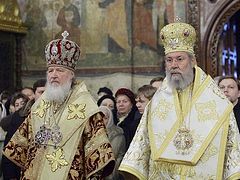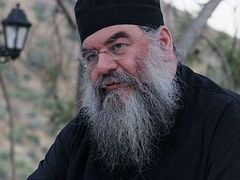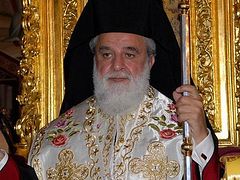Zaporozhye, Ukraine, December 18, 2019
In a recent interview, Archbishop Chrysostomos of Cyprus expressed some harsh criticism of the person and actions of Patriarch Kirill of Moscow in the context of the present Ukrainian crisis.
In his view, the Russian primate is an egotistical man who longs to be the First Among Equals in the Orthodox Church, but who is leading the Church towards a schism by not commemorating Patriarchs Bartholomew and Theodoros and Archbishop Ieronymos in the Divine services because they have entered into Eucharistic communion with the Ukrainian schismatics.
The Cypriot primate also took three of his own metropolitans to task for organizing a monastic conference with the Russian Church and for voicing their own opinions about the actions of the Patriarchate of Constantinople.
The three hierarchs, Metropolitan Athanasius of Limassol, Metropolitan Isaiah of Tamassos, and Metropolitan Nikephoros of Kykkos, responded to Abp. Chrysostomos in a joint statement.
Having learned of Abp. Chrysostomos’ statements, Metropolitan Luke of Zaporozhye of the canonical Ukrainian Orthodox Church also addressed the Cypriot primate in a statement published on his Telegram channel.
The statement is written in Met. Luke’s characteristic style of speaking straight and to the point. While the views he expresses are often stricter than the official stances of the Ukrainian or Russian Churches, as a ruling hierarch of the Orthodox Church, Met. Luke enjoys the freedom of having and expressing his own views.
His statement reads in full:
Archbishop Chrysostomos II of Cyprus, as we learned from the news, criticized the actions of Patriarch Kirill, as well as those hierarchs who support the UOC [canonical Church—Ed.]. His arguments are simple. The Patriarchs who have recognized the OCU [schismatic church—Ed.] are not heretics and Eucharistic communion should not have been broken with them. Therefore, the break in Eucharistic unity with them is the sin of schism, committed by the ROC.
We will answer these accusations in order. First, the Patriarchs and their Synod who recognized the OCU are heretics who have gone against the dogmas of the Church, in particular against the ninth article of the Nicene Creed. They have allowed for the possibility of the existence of “clergy” who may not even have the Apostolic Succession of ordination. The necessity of this succession has never been in doubt in the Orthodox Church until the Patriarch of Constantinople introduced this heresy in his new heretical theology. Additionally, we accuse Patriarch Bartholomew of several other, no less serious, transgressions, namely of the heresies of ethnophyletism and papism.
The Archbishop of Cyprus accuses Patriarch Kirill of wanting to be first, not noticing that it is not the Patriarch of Moscow, but of Constantinople who claims the role of the pan-Orthodox pope.
Second, was it necessary to break Eucharistic communion with the heretics?
It was necessary!
Imagine that you are sitting at table with a group of people and you are pouring wine from one jug in the middle of the table. One of those present openly, not hiding, takes some poison and pours it into the jug. The feast continues and everyone is invited to drink this poisoned wine. What should a prudent man do to stay alive? He must unambiguously refuse to partake of the poisoned wine.
The cessation of Eucharistic communion with heretics is not a whim of the ROC, but a measure of self-preservation. We know that according to the canons of the Church, any hierarch who serves with a heretic and communes together with him, becomes himself a heretic and excludes himself from the communion of the Church.
Therefore, we, at least the Ukrainian Church in prayerful unity with the Russian Church, must clearly point out the heretical starting points in the actions of the Bishop of Istanbul. The heresy introduced by him into the Church extends to all those who agree with it. There are no other options.
The Archbishop of Cyprus’ idea about the possible neutrality of his Church is as senseless as the idea that you can remain indefinitely under water without breathing and yet stay alive. To save your life, you have to come up, or drown and die. To sit for days or months under water without breathing won’t work.
The arguments that the Archbishop of Cyprus puts forth in his interview speak of two possible reasons for such a position. He either, owing to ignorance, does not in fact understand what is happening in the Orthodox world and does not realize the seriousness of the mistakes made by Constantinople, or he is disingenuous, trying to please both God and the devil. We think the second hypothesis is more likely.





